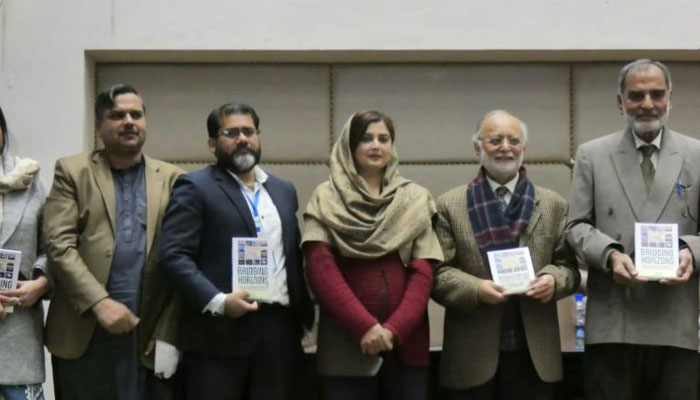Book unlocks potential of Pakistan, Central Asia connectivity
Islamabad:In an age where regional integration hinges on effective connectivity, Pakistan’s strategic geographical position offers a vital gateway to landlocked Central Asian states, a cost-effective and strategically advantageous trading partner for Pakistan. Realising the trade potential between these regions, however, requires overcoming policy, technical, and regional challenges through collaboration and visionary strategies.
This was the central theme at the launch event for ‘Bridging Horizons: Unravelling the Enigma of Connectivity between Pakistan and Central Asia,’ a book jointly authored by Dr Faisal Javaid, Dr Uzma Siraj, and Prof Dr Arkadiusz ukowski and published by IPS Press – the publishing arm of the Institute of Policy Studies (IPS), Islamabad.
The book explores the historical, economic, and policy-driven dimensions of Pakistan-Central Asia relations, offering actionable insights into challenges and opportunities for fostering stronger ties.
During the launch ceremony, hosted by the Federal Urdu University of Arts, Science and Technology here and attended by scholars, diplomats, policymakers and students, IPS chairman Khalid Rahman elaborated on Pakistan’s unique geographical position at the crossroads of South, Central, and West Asia.
He argued that this strategic advantage provides Pakistan an unparalleled opportunity to become a hub of regional connectivity. “To realise this potential, there is a need for not just visionary strategies but consistent policy implementation and proactive regional collaboration as well. Comprehensive integration strategies and foresight are essential to achieve meaningful regional connectivity and national benefit,” he said.
Emphasising the book’s central thesis, head IR Department at FUUAST Dr Uzma Siraj underscored that connectivity is the cornerstone of regional integration, where Pakistan’s strategic location connects landlocked Central Asian states to global markets. She noted that while the trade potential between Pakistan and Central Asian countries is immense, achieving this requires overcoming a multitude of challenges. The book presents actionable strategies to enhance connectivity, including exploring alternative routes, according to her.
In addition to exploring routes, it is important to ensure policy implementation and translate agreements into actions, noted former Ambassador to Uzbekistan Riaz Hussain Bukhari.
He said it had became urgent as Pakistan had signed over 255 bilateral and multilateral MoUs, protocols, and agreements with Central Asian countries since 1991. He projected that bilateral trade could grow to $4 billion with robust policies and investments.
Former ambassador Abrar Hussain said the book provided insights to recognize mutual opportunities and build upon the historical connections, as Central Asia and Pakistan have multidimensional historical, cultural, and trade ties dating back to the Indus Valley civilization. He highlighted Pakistan’s efforts following the disintegration of the USSR to strengthen these ties, referencing initiatives such as TAPI, CASA-1000, and the Trans-Afghan Railway.
FUUAST associate professor Dr Ihtshamul Haq delved into the trade potential between Pakistan and Central Asia. Citing the Gravity Model of International Trade, he explained how Central Asia represents a cost-effective and strategically advantageous trading partner for Pakistan.
-
 Travis Kelce Plays Key Role In Taylor Swift's 'Opalite' Remix
Travis Kelce Plays Key Role In Taylor Swift's 'Opalite' Remix -
 How Jennifer Aniston's 57th Birthday Went With Boyfriend Jim Curtis
How Jennifer Aniston's 57th Birthday Went With Boyfriend Jim Curtis -
 JoJo Siwa Shares Inspiring Words With Young Changemakers
JoJo Siwa Shares Inspiring Words With Young Changemakers -
 James Van Der Beek Loved Ones Breaks Silence After Fundraiser Hits $2.2M
James Van Der Beek Loved Ones Breaks Silence After Fundraiser Hits $2.2M -
 Disney’s $336m 'Snow White' Remake Ends With $170m Box Office Loss: Report
Disney’s $336m 'Snow White' Remake Ends With $170m Box Office Loss: Report -
 Travis Kelce's Mom Donna Kelce Breaks Silence On His Retirement Plans
Travis Kelce's Mom Donna Kelce Breaks Silence On His Retirement Plans -
 Premiere Date Of 'Spider-Noir' Featuring Nicolas Cage Announced
Premiere Date Of 'Spider-Noir' Featuring Nicolas Cage Announced -
 Pedro Pascal's Sister Reveals His Reaction To Her 'The Beauty' Role
Pedro Pascal's Sister Reveals His Reaction To Her 'The Beauty' Role -
 Kate Middleton Proves She's True 'children's Princess' With THIS Move
Kate Middleton Proves She's True 'children's Princess' With THIS Move -
 Paul Anka Reveals How He Raised Son Ethan Differently From His Daughters
Paul Anka Reveals How He Raised Son Ethan Differently From His Daughters -
 'A Very Special Visitor' Meets Queen Camilla At Clarence House
'A Very Special Visitor' Meets Queen Camilla At Clarence House -
 Jodie Turner Smith Shares One Strict Rule She Follows As A Mom
Jodie Turner Smith Shares One Strict Rule She Follows As A Mom -
 Hailey Bieber Reveals KEY To Balancing Motherhood With Career
Hailey Bieber Reveals KEY To Balancing Motherhood With Career -
 Photo Of Jay-Z, Other Prominent Figures With Jeffrey Epstein Proven To Be Fake
Photo Of Jay-Z, Other Prominent Figures With Jeffrey Epstein Proven To Be Fake -
 Hillary Clinton's Munich Train Video Sparks Conspiracy Theories
Hillary Clinton's Munich Train Video Sparks Conspiracy Theories -
 Fans Slam Talk Show Host For 'cringe' Behavior In Chris Hemsworth Interview
Fans Slam Talk Show Host For 'cringe' Behavior In Chris Hemsworth Interview




